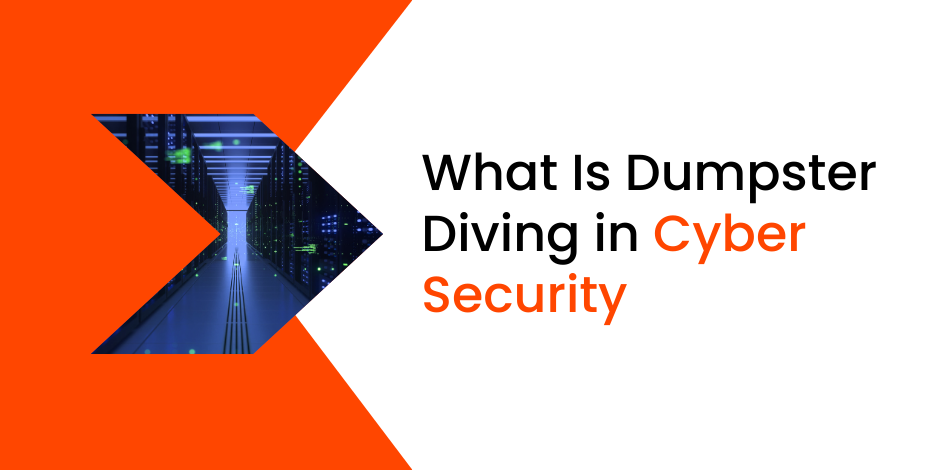What is Dumpster Diving in Cyber Security?

Stay Informed With Our Weekly Newsletter
Receive crucial updates on the ever-evolving landscape of technology and innovation.
Dumpster diving is a concept that has gained traction in cyber security circles in recent years. Understanding the intricacies of this phenomenon is crucial for businesses and individuals alike, as it has the potential to compromise sensitive data.
We explore the origins of dumpster diving in cyber security, its principles, techniques, and its impact on cyber security.
Understanding the concept of dumpster diving

Dumpster diving in cyber security refers to the act of extracting information from discarded physical or digital waste. It may seem like a crude method, but it has proven to be an effective means for cybercriminals to gain access to valuable data.
By rummaging through physical and digital dumpsters, perpetrators can find discarded documents, hard drives, or even deleted files that contain an abundance of sensitive information.
The origin of dumpster diving in cyber security
The origins of dumpster diving in cyber security can be traced back to the early days of hacking. As traditional hacking methods became more complex and sophisticated, cybercriminals realized that valuable information could often be accessed through much simpler means.
Dumpster diving became an attractive option due to its low cost, relative ease, and potential for high yields.
The role of dumpster diving in cyber security
Dumpster diving plays a significant role in enabling cyber attacks. Cybercriminals can gather valuable information to exploit vulnerabilities in a target’s system by accessing discarded documents and digital waste.
They leverage this information to carry out various attack techniques and gain unauthorized access to sensitive networks.
How dumpster diving facilitates cyber attacks
Dumpster diving facilitates cyber attacks by providing cybercriminals with valuable data that can be used to exploit weaknesses in an organization’s security infrastructure. The information obtained through this method allows attackers to craft highly targeted and convincing spear-phishing emails, which often lead to successful data breaches.
The connection between dumpster diving in cyber security and data breaches
Dumpster diving directly contributes to data breaches by providing cybercriminals with pieces of the puzzle necessary to gain unauthorized access to sensitive information. Even seemingly inconsequential pieces of information, when combined, can allow criminals to infiltrate systems and compromise highly valuable data.
The techniques used in dumpster diving

Dumpster diving encompasses various techniques employed by cybercriminals. These techniques can be broadly categorized into physical and digital data retrieval methods.
Physical dumpster diving techniques
Physical dumpster diving involves searching through discarded physical waste for valuable information. Cybercriminals visit dumpsters outside office buildings, research facilities, or any location where sensitive data may be discarded without proper consideration for security.
They painstakingly examine printouts, discarded hard drives, or even employee badges and passwords.
Digital dumpster diving techniques
Digital dumpster diving involves searching through digital waste for information that has been deleted, discarded, or forgotten. Cybercriminals use specialized software to recover deleted files, explore backup drives, or even exploit neglected cloud storage accounts.
By leveraging technology, criminals can recover confidential information that was assumed to be permanently deleted.
The impact of dumpster diving on businesses and individuals
The impact of dumpster diving on both companies and individuals is significant. Without proper safeguards in place, the repercussions can be devastating.
The risks associated with dumpster diving in cyber security
The risks associated with dumpster diving cannot be overstated. Businesses and individuals face the potential loss of proprietary information, financial loss, damage to reputation, and legal consequences. It also exposes personally identifiable information (PII), leading to identity theft and other malicious activities.
The consequences of dumpster diving for cyber security
Dumpster diving poses severe consequences for cyber security. Data breaches resulting from this practice are highly damaging and can cripple an organization.
The financial costs to remediate such breaches are significant, not to mention the loss of customer trust and confidence.
Preventing dumpster diving in cyber security

Preventing dumpster diving is essential for safeguarding sensitive information and maintaining strong cyber security practices.
Best practices for protecting against dumpster diving
Implementing best practices is critical for protecting against dumpster diving.
These include establishing clear data disposal policies, educating employees about the risks of careless disposal, shredding sensitive physical documents, and securely erasing digital files before discarding them.
The role of cyber security software in preventing dumpster diving
Cyber security software can play a crucial role in preventing dumpster diving. Employing advanced data loss prevention (DLP) solutions, monitoring software, and encryption technologies can help detect and prevent unauthorized access to sensitive data.
These measures act as additional layers of defense and significantly reduce the risk of dumpster diving.
Conclusion
Dumpster diving in cyber security is a significant threat that should not be underestimated. Its implications for businesses and individuals highlight the importance of effective preventive measures.
By understanding the origins, principles, techniques, and impact of dumpster diving, organizations and individuals can strengthen their cyber security posture and protect themselves against this ever-present threat.
You need the right skills and tools to protect yourself and your organization. Enroll in our cyber security program at the Institute of Data today and gain the expertise you need to defend against dumpster diving and other cyber threats.
We also offer free career consultations with our local team if you’d like to discuss your options.




